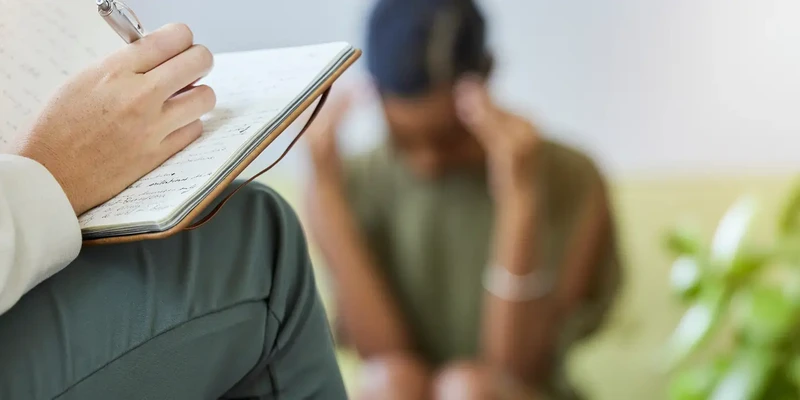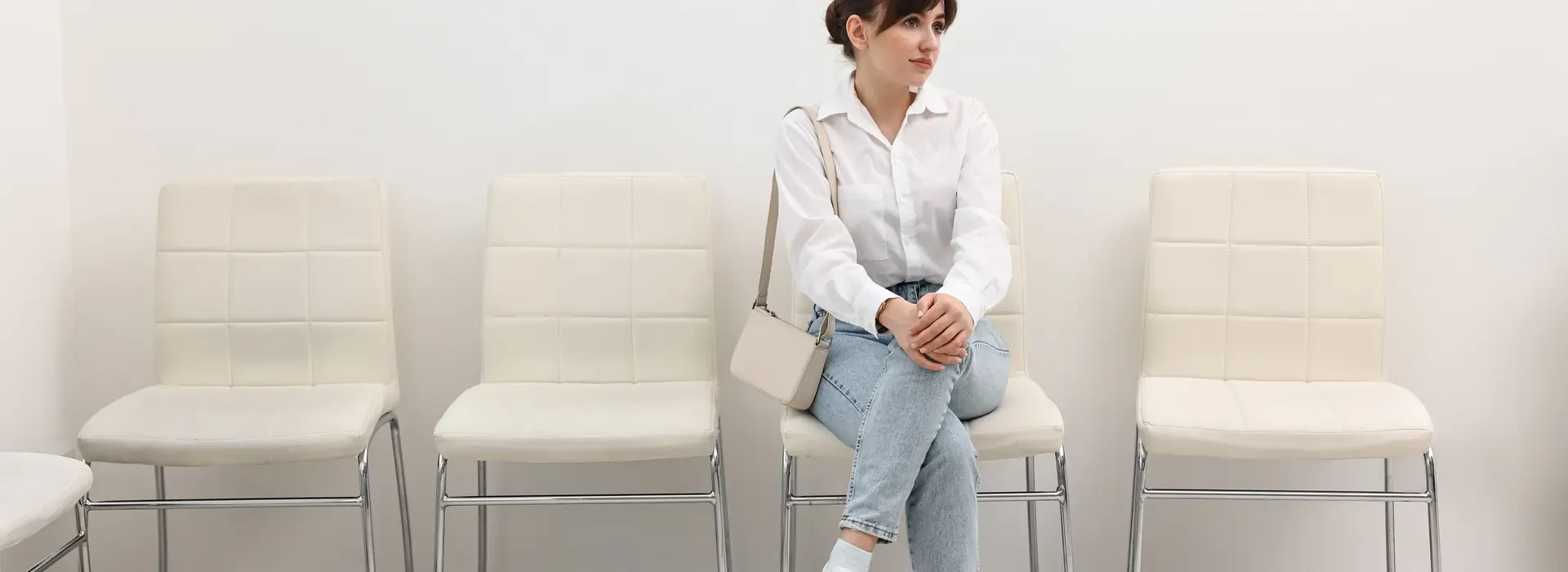Therapy for anxiety helps address persistent worry and fear through proven psychological approaches. It provides a supportive space to examine underlying causes, recognise patterns, and learn practical ways to manage anxiety symptoms.
Working with a trained mental health professional can guide you in developing healthier responses to triggers and building skills that improve day-to-day functioning. This process supports both emotional and physical well-being and allows progress toward improved mental health and a better quality of life.
Understanding Anxiety Disorders
An anxiety disorder is a recognised mental health condition characterised by persistent fear, worry, or unease that can disrupt your thoughts, emotions, and daily activities.
Types of Anxiety Disorders
Anxiety can manifest in various forms. These conditions may include generalised anxiety disorder (GAD), panic disorder, social anxiety disorder, phobias, and separation anxiety disorder.
Each has its own set of anxiety symptoms, triggers, and behavioural responses. Identifying the specific type is important in selecting the most suitable treatment option and improving long-term outcomes.
Common Signs and Symptoms
If you are struggling with an anxiety disorder, you may notice restlessness, a rapid heartbeat, muscle tension, difficulty sleeping, and constant worry. Other signs can include irritability, fatigue, difficulty concentrating, shortness of breath, and physical discomfort such as headaches or digestive issues. These anxiety symptoms may vary in intensity depending on the situation and your overall health.
Causes and Risk Factors
An anxiety disorder may develop due to a combination of genetic factors, brain chemistry, and personality traits. Exposure to stressful or traumatic experiences, certain medical conditions, and substance use can increase vulnerability. Major life changes and environmental stressors can also influence the onset and progression of symptoms.

What are the Different Types of Therapy for Anxiety?
Therapy for anxiety involves a range of well-established methods designed to ease symptoms, strengthen coping abilities, and enhance overall mental health. These approaches work by addressing the thoughts, behaviours, and emotional patterns that contribute to anxiety while teaching practical skills for everyday situations.
Cognitive Behavioural Therapy
Cognitive Behavioural Therapy (CBT) is one of the most researched and effective treatment methods for anxiety disorders. It works by helping you identify thoughts that intensify anxiety and replacing them with more balanced perspectives. In therapy sessions, you may work through real-life examples, explore how certain beliefs influence your emotional reactions, and practise techniques to interrupt unhelpful thinking patterns.
CBT can reduce anxiety symptoms like tension or rapid heartbeat while improving problem-solving abilities. The skills you gain through CBT can be applied in daily situations, making it easier to respond constructively to challenges rather than feeling trapped by anxious reactions.
Exposure Therapy
Exposure therapy is designed to help you face fears gradually instead of avoiding them. This method involves safely and systematically confronting situations, objects, or sensations that trigger anxiety, beginning with those that cause mild discomfort and progressing toward more challenging scenarios.
Each step allows you to experience these triggers in a controlled setting, which helps your nervous system adapt and reduce anxiety responses. This process can help you regain confidence in areas of life that anxiety may have restricted, such as travel, social interactions, or specific activities.
In a 2025 randomised controlled trial of 51 patients with social anxiety disorder, exposure therapy delivered through virtual reality led to a significant reduction in anxiety symptoms compared to relaxation training. The outcomes were similar to traditional in-person exposure therapy, showing that gradual and repeated exposure to feared situations can effectively reduce avoidance and build confidence.
Dialectical Behaviour Therapy
Dialectical Behaviour Therapy (DBT) combines mindfulness with skills that enhance emotional regulation, distress tolerance, and effective communication. For severe anxiety, DBT can be useful when intense emotions lead to reactive behaviours or strained relationships.
In therapy sessions, you might practise grounding exercises to reduce anxiety thoughts, learn strategies for tolerating distress without avoidance, and improve your ability to express needs clearly. These skills are taught through structured modules, with opportunities to apply them in daily life between sessions. By reinforcing these skills, DBT can help you manage anxiety alongside other emotional challenges.
Acceptance and Commitment Therapy
Acceptance and Commitment Therapy (ACT) focuses on acknowledging anxious thoughts and feelings without judgement, while taking actions that align with your values. Instead of attempting to eliminate anxiety, ACT encourages you to change how you relate to it.
In practice, this may involve identifying what matters most to you, recognising when anxiety is influencing your behaviour, and making intentional positive changes. This approach supports psychological flexibility, which can reduce anxiety symptoms and minimise the impact on decision-making, relationships, and personal growth.
Mindfulness-Based Stress Reduction
Mindfulness-Based Stress Reduction (MBSR) teaches you to bring your attention to the present moment through guided meditation, breathing practices, and gentle movement. These relaxation techniques help lower physical tension, slow racing thoughts, and improve awareness of how your body responds to stress.
Regular practice can enhance your ability to recognise early signs of anxiety and respond with strategies that prevent escalation. MBSR can be integrated with other therapies to provide both emotional and physical tools for managing anxiety in daily life.
Group Therapy
Group therapy offers a setting where you can interact with others who understand the challenges of living with an anxiety disorder. Under the guidance of a mental health professional, group members share experiences, practise coping skills, and provide mutual encouragement.
This environment allows you to gain insight from different perspectives, receive constructive feedback, and develop social confidence. Participating in a group can also reduce symptoms and help address various types of anxiety disorders.

Choosing the Right Therapy for Anxiety
Selecting the right therapy for anxiety is an important step in achieving progress and symptom relief. The process begins with understanding your current symptoms, recognising how they affect different areas of life, and identifying personal treatment goals.
It also involves reviewing the available evidence-based options and considering how each method matches with your comfort level and preferences. A well-matched treatment option increases the likelihood of improvement and may also reduce the risk of symptoms returning in the future.
Factors to Consider
When deciding on a therapy approach, it is helpful to consider the type and severity of your anxiety disorder. Previous experiences with therapy sessions, your openness to certain techniques like CBT, exposure therapy, or mindfulness-based methods, and the level of commitment you can maintain all influence success.
Furthermore, the availability of mental health professionals who specialise in the chosen method, session frequency, and how easily you can integrate practice exercises into your daily routine are also important factors. Thinking through these elements can help you choose a treatment option that offers the best chance for lasting change.
Finding a Qualified Therapist
A licensed and experienced mental health professional is essential in treating anxiety disorders effectively. They should have specific training in evidence-based approaches or other targeted interventions. A skilled therapist can explain the rationale for each method, guide you through techniques like relaxation techniques or gradual exposure, and adapt the process to address your individual needs.
Checking credentials, confirming relevant experience with your specific anxiety disorder, and seeking referrals from trusted sources can ensure you find someone well-suited to support your goals. This foundation of trust and expertise plays an important role in delivering an effective treatment outcome.
Personalising Your Treatment Plan
A personalised treatment option is developed through assessment of your anxiety symptoms, history, and progress. For example, if you live with GAD and frequent muscle tension, your plan might combine CBT with relaxation techniques to reduce anxiety responses.
If you have panic disorder, strategies such as interoceptive exposure can help reduce fear of bodily sensations and prevent a panic attack. Those with social anxiety disorder may benefit from a combination of exposure therapy, skills training, and group therapy sessions to build social confidence.
Generally, a collaborative approach, where you and your therapist review progress regularly, ensures that the therapy involves interventions that match your changing needs.
Effectiveness of Treatment for Anxiety
Research consistently shows that therapy for anxiety can reduce anxiety symptoms, enhance coping abilities, and improve overall functioning. Evidence-based options like CBT, exposure therapy, and mindfulness-based programs are considered first-line interventions for most anxiety disorders.
In some cases, medication may be added to further support progress, particularly for severe anxiety or when symptoms interfere with daily responsibilities. The effectiveness of any treatment option depends on active engagement, consistency between therapy sessions, and the integration of learned skills into daily life.
Addressing co-occurring conditions such as anxiety and depression or post-traumatic stress disorder can also enhance outcomes, as untreated secondary issues may hinder recovery.

Benefits of Treating Anxiety Disorders
Managing an anxiety disorder through professional care can lead to numerous benefits beyond symptom reduction. You may notice improvements in mood, better sleep quality, increased focus, and healthier relationships. Learning to manage anxiety with evidence-based strategies can also decrease the likelihood of future relapses.
Addressing severe anxiety early can prevent physical complications caused by prolonged stress responses, such as cardiovascular strain or digestive problems. For individuals who experience recurrent panic attacks, effective care can significantly reduce frequency and intensity, which allows greater freedom in daily life.
Furthermore, treating anxiety can improve resilience when facing major life stressors and reduce the risk of relying on substances, like alcohol, to cope.
Connection Between Anxiety and Addiction
The link between an anxiety disorder and substance use is well established in mental health research. Some individuals turn to alcohol, sedatives, or other substances in an attempt to reduce anxiety symptoms, which can develop into dependency.
In the long run, this cycle can worsen both conditions, as substance misuse may intensify anxiety symptoms or lead to new issues such as PTSD after negative experiences. Integrated care, where therapy involves addressing both the anxiety disorder and substance use, is considered one of the best approaches.
Break Free from the Grip of Anxiety
Anxiety can affect how you think, interact, and experience each day. Professional therapy provides practical ways to ease symptoms and build skills that support better mental health.
With the right guidance, you can work toward feeling more capable in handling challenges and enjoying daily life.
Frequently Asked Questions
What are the Most Effective Anxiety Therapies?
Cognitive Behaviour Therapy, Exposure Therapy, and Mindfulness-Based interventions are among the most effective, which help reduce symptoms and strengthen coping abilities through evidence-based techniques.
How Can I Find a Qualified Therapist?
Seek a licensed mental health professional with proven experience in anxiety treatment, confirm their training in evidence-based methods, and review professional profiles or recommendations for suitability.
Are there Self-Help Strategies that Can Manage Symptoms of Anxiety?
Practising mindfulness, engaging in regular exercise, maintaining healthy sleep, and using relaxation techniques can help reduce anxiety, particularly when combined with professional care.
When Should I Seek Professional Help for Anxiety?
Professional help is recommended when symptoms are persistent, disrupt daily life, or cause significant distress despite efforts to manage them with self-help strategies.
How Long Does Anxiety Therapy Usually Take?
Treatment length varies by severity, therapy type, and response, but many evidence-based programmes range from 8 to 20 sessions.
Can Group Therapy be Effective for Anxiety Treatment?
Yes, group therapy can improve social confidence, provide mutual support, and teach practical coping skills within a professionally guided environment.







